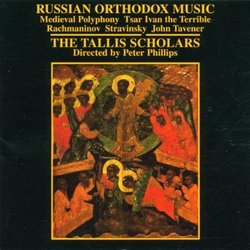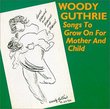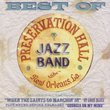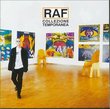| All Artists: The Tallis Scholars Title: Russian Orthodox Music Members Wishing: 0 Total Copies: 0 Label: Gimell Records Release Date: 3/12/2002 Album Type: Import, Original recording reissued Genres: Special Interest, Classical Styles: Opera & Classical Vocal, Historical Periods, Classical (c.1770-1830), Early Music Number of Discs: 1 SwapaCD Credits: 1 UPC: 755138100220 |
Search - The Tallis Scholars :: Russian Orthodox Music
 | The Tallis Scholars Russian Orthodox Music Genres: Special Interest, Classical
|
Larger Image |
CD DetailsSimilarly Requested CDs
|
CD ReviewsStunning! FrKurt Messick | Bloomington, IN USA | 04/05/2004 (5 out of 5 stars) "--Music- The music of the Orthodox church, as one might expect, is heavily reliant upon tradition and continuation of past patterns and inspirations. There is little separation between theology, spirituality, indeed even politics and art, in the Orthodox world, so of course music will similarly be infused with such influences. Much of the early music is anonymous - various medieval motets (12-part and 8-part pieces) are done with some external influences evident, but still bearing a primary Orthodox stamp. There is even one monodic chant attributed to Tsar Ivan the Terrible from the mid-1500s. The later compositions from named composers include such well-known creators such as Stravinsky, Rachmaninov and Tavener (perhaps best known outside of Orthodox circles for the stunning piece of his performed at the funeral mass of Diana, Princess of Wales). The music is both grand and simple, familiar yet alien. All of these pieces are glorious compositions of extraordinary power and grace. Taken as a set, they make a wonderful snapshot of Russian Orthodox music from medieval times to the present. All subsequent liturgical music in the Orthodox church can trace its origin to this time; either in development from or in reaction to the standards developed during the earlier time, represented here, and the flowering into the modern world is similarly shown as a power in music hopefully to be developed further as the Orthodox church in Russia recovers from a century of repression..--Liner Notes-- Being internationally acclaimed, the Tallis Scholars' CDs typically present their commentary and texts in English, French, German and Italian (together with any original language texts - in this case, Russian); that is true of this disc. The cover art also typically represents visual arts contemporary with the compositions - here it is an icon from the sixteenth century, the 'Descent into Hell', part of the Pskov school. One drawback is that there is little information on the Tallis Scholars or Peter Phillips in the booklet.--The Tallis Scholars- The Tallis Scholars, a favourite group of mine since the first time I heard them decades ago, are a group dedicated to the performance and preservation of the best of this type of music. A choral group of exceptional ability, I have been privileged to see them many times in public, and at almost every performance, their singing seems almost like a spiritual epiphany for me, one that defies explanation in words. Directed by Peter Phillips, the group consists of a small number of male and female singers who have trained themselves well to their task.Their recordings are of a consistent quality that deserve more than five stars; this particular disc of pieces of Russian Orthodox Music, rarely heard in the West, deserves a place of honour in the collection of anyone who loves choral music, liturgical music or Gregorian chant, classical music generally, or religious music. It is astonishing, particularly as it is one of the earliest recordings of the Tallis Scholars (this recording dates from 1982)." A voice teacher and early music fan George Peabody | Planet Earth | 03/05/2006 (5 out of 5 stars) "BREATHTAKING BEAUTY DELIVERED BY THE TALLIS SCHOLARS!
A group of selections from the pre-history of Russian Orthodox music precedes a leap to the 20th century, ending with a 'look-back' salute to Bortniansky, the giant of the 19th century. Two themes are present here: western influence in Russian Church music, and masterpiece. These are familiar sound from early western music beginning with the Ars Nova, and the very fine notes outline the likely influence and genre which provide a rare and fascinating perspective on this tradition. Mostly the bulk of this recording (22 min.) is devoted to John Tavener's (1944)landscape using as text the penitential canon of St. Andrew of Crete. Texts are in Slavonic and English, with translations in English,French, German and Italilan. The twelve and eight part motets recorded on this album are the direct results of the Polish-Ukranian influence; part singing which was an attempt to imitate the new polychoral writing of such composers as Schutz and Gabrielli. The harmonic language is obviously more consonant than that of the earlier works and brings to mind the English composers of the Renaissance. Included on this disc are two brief motets of Stravinsky and although they are several hundred years distant from these early pieces, they have something in common in their approach to text setting and in their austere harmonic style. Rachmaninov's "Lord's Prayer" belongs to a different facet of sacred music which concerned itself with the richness of sound. Since 1977 John Tavener's music has been written almost entirely for the Orthodox rite."Mnogaya lieta" by Bortniansky is a traditional valediction,sung after the Liturgy on suitable occasions. There are many reasons why one should purchase this album: one being that this group of Tallis Scholars from 1982 is the finest I have heard in the many years of the Tallis Scholars. Another reason is for the variety of literature included on the disc. I was attracted to the 6 medieval motets (anonymous) which are recorded in a descant style whereby a chant is harmonized by two voices,one above and one below. The highpoint for me was Rachmaninov's "Lord's Prayer" which is sung in English as are the selections by Tavener and Bortniansky. The high standard of performance of the Tallis Scholar's singing this complex music shines through the entire recording. The disc is unaccompanied as it should be. With singing as lovely as this who needs instruments!?" |

 Track Listings (14) - Disc #1
Track Listings (14) - Disc #1






